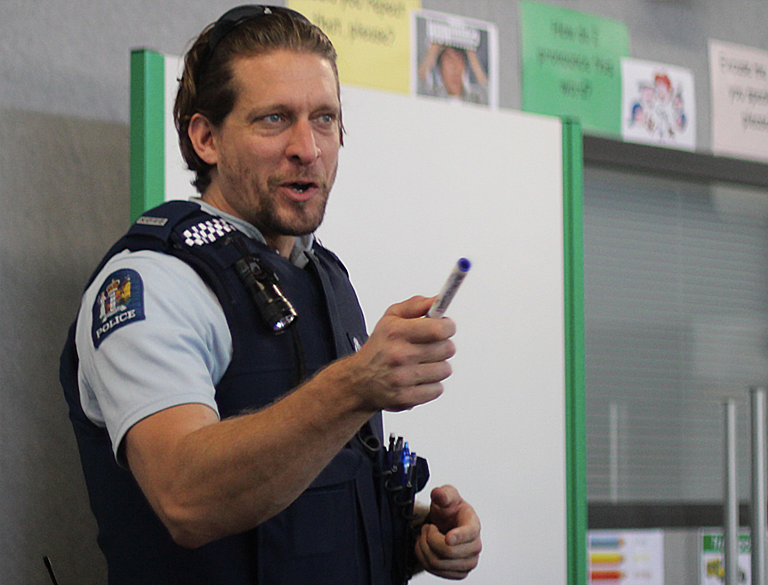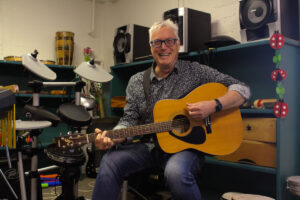Cop welcomes refugees with a smile
Ethnic liaison officer Constable Rob Stanton puts new refugees at their ease with a joke and a smile at the Mangere resettlement centre.
“They’re not the best jokes and I’m not a comedian, but it does break the ice.”
For refugees fleeing torture, harm or imprisonment in their home countries, ethnic liaison officer Constable Rob Stanton is the first face of the New Zealand police force they experience.

The three-hour presentation he gives to new refugees at the Mangere resettlement centre explains their legal rights and responsibilities in New Zealand.
Many of the refugees come from countries where police brutality and corruption are common-place.
“One in five of our refugees has experienced or witnessed violence at the hands of authorities. Whether that is being arrested and detained unlawfully or right through to physical violence. You can imagine their perceptions and fears around police are quite high.”
It is a tough crowd to crack and jokes, even when “they’re not the best jokes”, help.
“I start by demonstrating some of the appointments on my belt. I’ll take out the baton — I’m sure they all know what a baton is for, but I’ll pretend it’s good for scratching my back under the police vest.”
Pepper spray, he tells them, is good for dealing with violent offenders and great for adding spice to his lunch.
“Once they start laughing we get some good questions from them.”
One of the most common questions he faces are those around their rights to self-defence if someone comes into their home wanting to kill them.
“It’s things most New Zealanders don’t consider as a high risk on a daily basis.”
Resettling refugees successfully is complex. Many have experienced trauma and have mental health needs, others have limited English. For most, the culture-shock is enormous.
The six-week programme run at the Mangere resettlement centre for all refugees has been described as world-leading by the United Nations High Commissioner for Refugees.
It aims to help refugees settle into an independent life in New Zealand, with a focus on employment and developing a sense of belonging within the communities they are placed in.
Constable Stanton’s role is to explain how the police in New Zealand operate and to teach refugees New Zealand laws, many of which are different from what they are accustomed to.
His presentation covers basic road safety, family violence, firearm ownership, self-defence and joining the police force.
For the refugees who have escaped violent countries Constable Stanton said one of the biggest cultural differences is the rights of offenders and laws around self-defence.
“I get shocked looks when I tell them they could be criminally liable for excessive force.”
A refugee from Iran, Cyrus Basham, said some of Constable Stanton’s jokes were funny.
Basham arrived in 2016 after fleeing a sentence of jail and lashes for exposing government caused environmental damage.
“When they told me I was coming to New Zealand I was very happy because I had read New Zealand government and New Zealand police are one of the least corrupted in the world.”
Basham said the police presentation was one of the best programmes at the resettlement centre and Constable Stanton took the time to answer all the refugees’ questions.
Police in Iran are not people you want to talk to, Basham said.
“In Iran, you don’t even dare to make eye contact with them because they will come to you and beat you up and rob you. It’s very different.”
Indonesia, where Basham spent more than three years waiting for his refugee application to be approved, was only slightly better.
“In Indonesia police are very corrupted, but at least when you make eye contact with them they smile — and then they ask for a bribe.”
Basham, who is currently working in a field unrelated to his qualifications, is considering the recruitment information given during Constable Stanton’s presentation.
“I was thinking of joining the police in New Zealand. It’s still one option for me.”
Constable Stanton said questions from refugees about how to join the police are common.
“We are very keen for them to eventually join the police but it’s not a realistic goal when they first arrive because they will need to get to know the culture and the language. We certainly would encourage them to consider it in the future.”
Constable Stanton said there are two officers currently with refugee backgrounds and another two going through the recruitment process. Work was being done with young former refugees who have grown up in New Zealand.
“In fact, even today I spoke with a school student who was originally from Myanmar. He’s coming to his final school year and he’s really keen to join the police so I went to his school to speak with him today and give him encouragement to pursue that further down the track as he’s still quite young.
“The skills they bring – language and cultural – are crucial to us in the future.”




